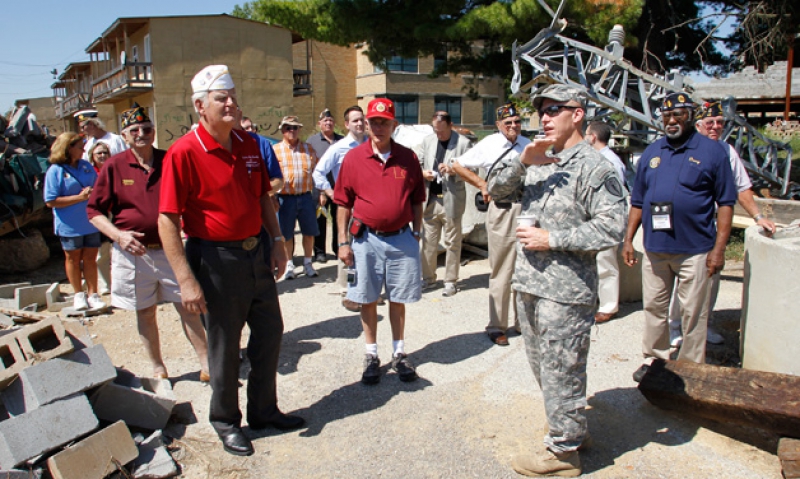
Members from the National Security & Foreign Relations Commission tour the state-of-the-art urban training facility.
Rural Indiana – with its winding gravel roads, cornfields and wide-open spaces – evokes a feeling of remoteness that is unique only to certain parts of the Midwest. But it’s this serene setting, near the Kentucky-Indiana border, that is the backdrop for Muscatatuck Urban Training Center, a state-of-the-art 1,000-acre compound that is capable of emulating any battle scenario or harsh environment that could be found anywhere in the world.
Members of The American Legion’s National Security & Foreign Relations Commission toured Muscatatuck on Aug. 24, getting an up-close look at the facility that features a replica Afghan marketplace, hospital, prison and downed aircraft field, among many other training grounds that can prepare servicemembers for virtually any danger they could encounter overseas.
Founded in 2005, Muscatatuck is a self-sustaining community, located near the town of Butlerville and leased by the Indiana National Guard from the state of Indiana. It serves both civilian and military entities, preparing them for any form of combat they could see in their duties as Navy SEALs, police officers, SWAT team members, first responders or disaster-response personnel.
“We’re trying to provide anyone who comes here with the most realistic experience they’re going to encounter, whether that’s overseas in a country like Afghanistan or at home here in a typical urban environment,” said Maj. Shawn Eaken, an officer at Muscatatuck. “We want to make it as real as possible.”
Muscatatuck’s goal is to fully immerse anyone training there. Its wide swath of land is home to nine miles of roads, an underwater neighborhood that simulates a flood disaster, functioning sewage and power plants, farms that raise animals indigenous to different countries, and a mile of tunnels underneath the property.
“I think I was in those tunnels 40 years ago, except it was in Vietnam,” said Dave Warnken, a National Executive Committeeman from Kansas.
Any location or building on the facility’s property can be used in combat simulations or first-response scenarios. The power plant that provides Muscatatuck with electricity can be used for a mock rescue drill where servicemembers have to liberate the plant from insurgents and restore power. Or, the town’s convenience store can give robbery-in-progress training to police officers.
With 200 different buildings, the possibilities are numerous.
“What impressed me a lot was the realism of the facility, as well as the training methods,” said Mike Schlee, National Security & Foreign Relations chairman. “As a young lieutenant in September of 1967 in Vietnam, I went into what was a hostile environment and hostile situation, and I was totally unfamiliar with what I encountered.”
It was serendipity that brought Muscatatuck to the National Guard. Previously, the grounds were home to the Muscatatuck State Developmental Center, created in 1919 as a mental hospital. The facility closed in 2001 after a reorganizing of the state’s health plan.
The land was being readied to turn in to a tree farm when the Indiana National Guard put in a bid to lease it in 2005 and transform it into an urban training center.
“It’s a very impressive facility,” Schlee said. “It’s a wise investment for the training and ultimately the safety of the troops.”
The trip was organized by the Legion’s National Security & Foreign Relations Division. Many of the commission’s members were in nearby Indianapolis for the Legion’s 94th National Convention.
The group visited Muscatatuck’s various buildings and sites – a tour that included a walkthrough of the jail and the hospital that was abandoned in 2001. Previous caretakers of the hospital literally “got up and left,” leaving behind operation chairs, surgery tables and medical quackery devices from the middle of the 20th century.
Eaken said the hospital’s debris makes training there more realistic.
“When the military goes overseas, these are some of the things they might see in a hospital there because those countries aren’t as advanced,” he said.
Muscatatuck made a strong impression on the commission members because of its expansiveness and the valuable service it provides in preparing servicemembers. It also gave them some guidance as to how to craft their legislative priorities and resolutions at the upcoming Fall Meetings in October.
One of the chief items on the commission’s agenda this fall will be Muscatatuck’s Patriot Academy, which will close in December after three years of operation. The academy is located on the premises and is a fully functioning high school that brings in drop-outs from all over the country to give them a chance to earn their diplomas. Students come to the academy after completing basic training. They earn military pay and hone their service skills there, then return to their state’s National Guard when they graduate.
Committee members spent an hour touring the academy and learning about its value to the military and society. The school’s $6 million annual upkeep cost is misleading, they learned, as the Patriot program is getting a good return on its investment. The taxpayer spends money on helping these dropouts get their diplomas now, rather than spending on them later through incarceration or unemployment.
Graduates from the school move on to be productive members of society and pursue careers in the military.
“From what we heard today, the cost-return ratio of the academy doesn’t burden the taxpayer,” Schlee said. “It seems silly to eliminate a facility that costs you totally $6 million a year, which in terms of the Pentagon budget is miniscule, especially when you consider that the facility can return tens of millions of dollars back to the American public. Additionally, the quality of life for the young men and women who go through there will also improve.”
Schlee and all the committee members agreed that keeping the Patriot Academy open will be among their priorities at Fall Meetings.
“We’ll be drafting a resolution for consideration at the Fall NEC Meetings to urge Congress to keep the funding for the Patriot Academy,” Schlee said.
- Convention

